Immun System
All information about "Immun System" and the related magazine articles can be found here.
Our articles are written clearly and link to scientific studies where relevant. This is how we meet our own standards: we regularly deliver new, high-quality content for you—free of charge, no sign-up required, with the highest possible benefit to you.

Summer, sun, full concentration!
How phosphatidylserine and omega-3 can boost your concentration
The sun is shining but your concentration is waning? Discover how phosphatidylserine and omega-3 fatty acids can naturally boost your mental performance.

Relaxed baby bump: Natural support with inositol, folic acid, cranberry & D-mannose
Balance and well-being for women who want to have children or during pregnancy
Wanting to have children or already pregnant? A lot changes during this special phase. Smart nutrients such as inositol, folic acid, cranberry and D-mannose can provide targeted support: They promote hormonal balance, strengthen the urinary tract and bring more balance to everyday life. Find out now how you can do something good for yourself naturally.

Start your vacation full of energy with potassium & magnesium citrate
How to keep you and your family fit, active and balanced even in the heat
On summer vacation, electrolytes such as potassium and magnesium quickly become unbalanced. This can affect energy, muscles and concentration. Find out here how you can strengthen your inner balance with smart nutrition and targeted supplements.

Strong heart, strong life. Promoting men's health naturally
Gain new energy and vitality with coenzyme Q10, chokeberry as a medicinal plant and targeted care for the cardiovascular system.
The heart is the engine of your life - and men in particular should pay special attention to it. Find out how you can use the effects of coenzyme Q10, the healing power of the aronia berry and a healthy lifestyle to strengthen the function of your cardiovascular system and support your overall health as a man.

When the hormone balance changes
Gentle nutritional support through the menopause
The menopause changes many things - both physically and emotionally. Myo-inositol, vitamin D3 and magnesium can help to boost your well-being, support your metabolism and activate new sources of energy. Find out more here!

Comfort food for super moms
Choline, lecithin & vitamin B12 - powerful micronutrients for a strong pregnancy
Did you know that certain nutrients can have a positive effect not only on your well-being, but also on your baby's development? Choline, lecithin and vitamin B12 are little helpers with a big effect - for strong nerves, clear thoughts and a good gut feeling during this special time.

Playground power for every day
Calcium & vitamin K2: For bone health that grows with you
Whether romping around with the children or the daily balancing act between job and family - strong bones are the stable foundation. Find out how calcium and vitamin K2 can playfully help to strengthen your bones.

Naturally powerful: Turmeric, boswellia & ginger
Learn how to gain more zest for life with plant power
Plant-based active ingredients can help to reduce inflammation and make everyday life more active and mobile - whether in the garden, during sport or on a family outing.
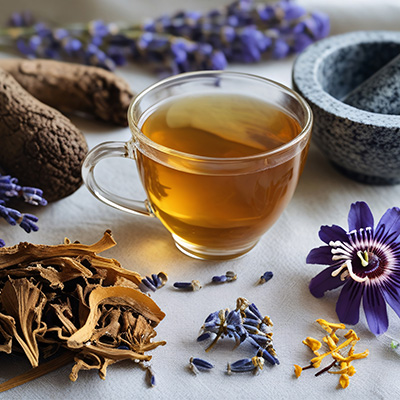
Finally sleep well again - even in summer!
Discover natural sleep aids with melatonin, passion flower & co.
Is the summer light depriving you of sleep? We show you how you can support your sleep-wake rhythm with natural remedies such as melatonin and passionflower.

Sun protection from within - with the power of vitamin A, astaxanthin and omega-3
Strengthen your skin with natural nutrients that reduce oxidative stress, soothe inflammation and prevent premature ageing.
The first rays of sunshine are here - but your skin is particularly sensitive after the winter. Discover how vitamin A, the antioxidant astaxanthin and essential omega-3 fatty acids can protect your skin from the inside out and optimally prepare it for UV radiation. For a radiantly healthy complexion and effective anti-ageing support.

Spring cleaning for the body!
Drain naturally - with nettle, dandelion & potassium
Find out more about dandelion, stinging nettle and potassium to gently drain your body and get back on track with ease!

Naturally against allergies - Black cumin oil and quercetin in use for your well-being
Gentle support from nature for hay fever, pollen allergies and allergic reactions
Itchy eyes, sneezing attacks and constant pollen stress? Black cumin oil and quercetin offer natural help for allergic symptoms. Find out how the two herbal active ingredients work, when it is the right time to use them and what you should look out for when choosing them.

Strong through the pollen season with omega-3 and vitamin E
How to strengthen your child's airways
When pollen irritates the airways, it can quickly become unpleasant for children. Find out why omega-3 and vitamin E can not only support but also prevent and how you can easily incorporate the two substances into your everyday life!
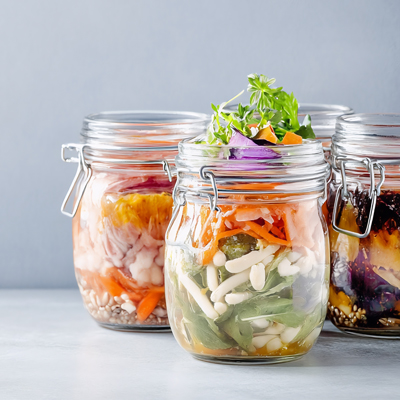
Fit for spring: Stimulate metabolism with inulin, probiotic foods & intestinal cure
Intestinal cleansing for better digestion, the natural effects of inulin and the benefits of probiotic foods for your metabolism
Get a vital start to spring and bring your body into balance - with targeted nutrition that boosts your metabolism, supports digestion and rebalances your gut with the help of a gut cleanse, inulin and probiotic foods. Find out how to boost your gut health and gain new energy - from the inside out!
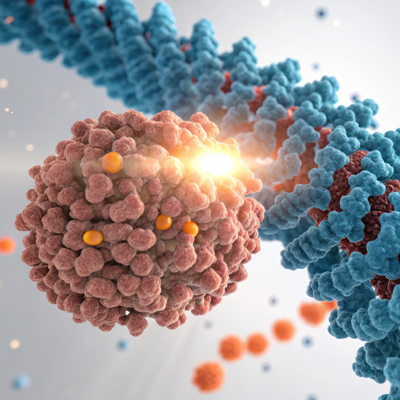
New cell energy with B vitamins, NADH and alpha lipoic acid
NADH, alpha lipoic acid and B vitamins play a central role in human metabolism for energy, concentration and cell protection.
Discover how these nutrients support the body against exhaustion, oxidative stress and loss of performance - for more vitality and mental strength in everyday life!

Sleep better with lemon balm, passionflower and L-theanine
These natural helpers bring peace to your evening
Sleep disorders? Stress in the evening? Herbal helpers such as lemon balm, L-theanine and passionflower can gently support the sleep-wake rhythm and help you to finally calm down. Read the article now to find out how you can harness the power of nature for restful nights.

Spring fever for the soul
Naturally more balance with 5-HTP, L-tryptophan and vitamin B6
The sun is shining - but everything still feels heavy inside?
These three mood boosters gently help you arrive in spring: for more rest, sleep and stability. Find out more here!
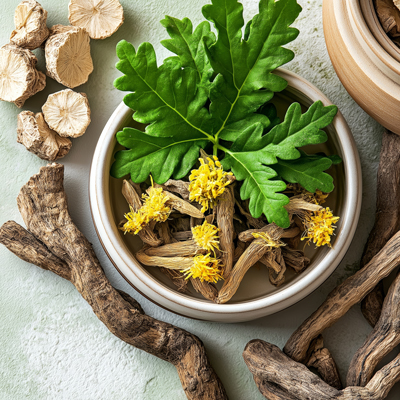
Building inner strength - more relaxed through spring
Plant adaptogens for more balance, energy and mental freshness
Spring is the perfect time to recharge your batteries and do something good for yourself. Rhodiola and cordyceps provide natural and effective support. Find out more here!

Strengthen your immune system with rockrose, zinc and vitamin C
Natural support for your immune system
Cistus, zinc and vitamin C can provide your body with valuable support in moody weather. Find out how these three building blocks gently strengthen your defenses and give you more well-being in everyday life.

Start spring naturally fit with L-citrulline & cordyceps and recharge your batteries
Experience the invigorating power of nature and science. For new energy, strong blood vessels and mental freshness. Ideal for anyone who wants to get off to a powerful start.
The days are getting longer, the light is returning and now is the time to give your body a gentle boost. The combination of L-citrulline, an amino acid that promotes blood circulation, and the vital mushroom cordyceps supports you in a natural way. For more performance, better focus and an all-round vital body feeling.

Moving through spring: supporting joints naturally with MSM, glucosamine and chondroitin
Find out how your joints work - and how targeted nutrients, exercise and high-quality supplements can promote your mobility.
Movement is often difficult after winter. Stiff joints and limited range of motion are not uncommon. Natural active ingredients such as MSM, glucosamine and chondroitin can help to support normal joint function and prevent discomfort. Now is the ideal time to get going with renewed energy. Moving, vital and well nourished into spring.

Vitamin D3 and K2: the perfect combination for bones and well-being
Find out why vitamin D3 and K2 are so important, especially in the dark season, and how they support your immune system and bone health.
Vitamin D3 helps to banish the winter blues, while vitamin K2 promotes the optimal utilization of calcium. Discover the best food sources and find out when targeted supplementation can be useful.

Stopping cravings: How chromium stabilizes your blood sugar levels
Find out why the trace element chromium can reduce cravings and how it supports your metabolism.
Chromium helps regulate blood sugar levels, helps prevent sudden hunger and promotes long-term wellbeing. Discover the benefits of this important nutrient and find out how you can specifically integrate it into your diet!
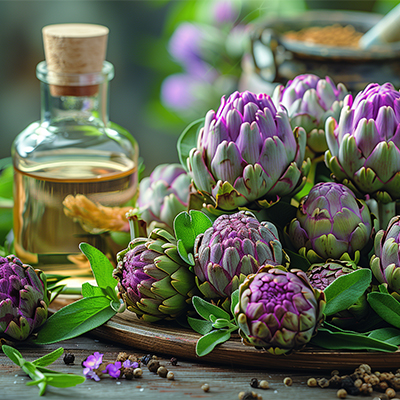
Thanks to bitter substances and enzymes, a naturally spring-fit and healthy digestion
Find out how bitter substances and enzymes stimulate your digestion, alleviate digestive problems and gently balance the gastrointestinal tract.
Bitters and enzymes naturally support digestion, relieve bloating and promote general well-being. Discover how you can get off to a fresh and stomach-friendly start with bitter foods, the right diet and high-quality food supplements. For a good gut feeling, day after day.
Strengthen your immune system: Our body's own protective shield needs support
Our immune system is a complex network that protects us from pathogens every day. It is our body's own protective shield against viruses, bacteria and other harmful influences. In the following, we will take a closer look at how our immune system works, how we can strengthen it and what role our diet, sufficient exercise and our general lifestyle play.
What are the four components of our immune system?
Our immune system has four components that work together to ensure a comprehensive defense against pathogens.
Component 1: Physical and chemical barriers
Physical barriers form the first line of defense against intruders. Physical barriers include:
- The skin is the largest organ in the body, forming a waterproof barrier that keeps pathogens out.
- Mucous membranes that line the respiratory, digestive and urogenital tracts.
- Mechanical barriers such as cilia in the respiratory tract that remove germs.
- Chemical barriers such as gastric acid, enzymes in bodily fluids (e.g. saliva, tears) and sweat, which have an antibacterial effect.
Component 2: Cellular Defense
The cellular defense is a central component of our immune system and consists of various types of white blood cells, also called leukocytes. These cells circulate in the blood and can penetrate into tissue to fight pathogens. The most important players in the cellular defense include the phagocytes, which patrol the body and recognize and destroy intruders. In addition, T cells and other specialized immune cells play a crucial role in acquired immunity. These cells can identify specific pathogens and trigger a targeted immune response. Together, these different cell types form an effective defense system that protects our body from a variety of threats.
Component 3: Humoral Defense
The humoral defense is an important part of the immune system, which consists of various molecules that circulate in the blood and other body fluids. Antibodies that are specifically directed against certain pathogens play a central role in this. These proteins recognize and bind to intruders in order to mark them for the immune system or to render them harmless. Complement proteins, which support the immune defense in a variety of ways, work in conjunction with them. For example, they can directly destroy pathogens or activate other immune cells.
In addition, there are other proteins and chemical substances that contribute to the immune defense by regulating inflammatory reactions or promoting communication between different parts of the immune system.
Component 4: Lymphatic system
The lymphatic system plays a central role in coordinating our body's immune response. It consists of a network of organs and tissues distributed throughout the body. The most important lymph organs include the spleen, lymph nodes, tonsils and Peyer's patches in the small intestine. These organs act as filter stations that trap and neutralize microorganisms. At the same time, they serve as collection points for mature immune cells, where they are activated and can trigger specific immune responses.
The thymus gland, which is particularly active during childhood, plays a particularly important role. It is instrumental in the development and maturation of T cells, which play a key role in the cell-mediated immune response. Through the interaction of these various components, the lymphatic system enables an effective and coordinated defense against pathogens and thus contributes significantly to maintaining our health.
The two main categories of the immune system
Our immune system consists of two main categories, the innate and the acquired immune system:
Innate (non-specific) immune system
The innate immune system is present from birth and forms the first line of defense against pathogens. It reacts quickly and non-specifically to intruders, which means that it treats all foreign substances similarly.
Key features of the innate immune system:
- It is ready to use and can respond quickly to threats.
- It recognizes a limited number of antigens, but these occur on many different pathogens.
- It includes physical barriers such as skin and mucous membranes, as well as chemical barriers such as stomach acid.
- Important cell types include natural killer cells, monocytes (which develop into macrophages), neutrophils, eosinophils, and basophils.
- It also includes the complement system, a series of proteins that can trigger a cascade of reactions.
- Cytokines play an important role as messengers in the immune system.
Acquired (adaptive) immune system
The acquired immune system develops over the course of a lifetime and specifically adapts to new threats. It reacts more slowly but more precisely, and has a memory for previous infections.
Key features of the acquired immune system:
- It takes time to react because it must first recognize the specific pathogen or virus.
- It is highly specific and targets certain pathogens.
- The main players are T-lymphocytes (T-cells) and B-lymphocytes (B-cells).
- T cells have various functions, including activating other immune cells, destroying infected cells and forming memory cells.
- B cells produce antibodies that are specifically tailored to certain pathogens.
- It can remember pathogens, which leads to a faster and more effective immune response upon renewed contact.
Which immune system is stronger?
There is no clear answer to the question of whether the innate or the adaptive immune system is stronger. Both systems have their strengths, work closely together and complement each other. While the innate system provides the first rapid response, the adaptive system ensures targeted and long-lasting immunity.
Which blood value corresponds to the immune system?
There is no single blood value that represents the entire immune system. However, various values can provide clues as to how the immune system is functioning:
- Leukocytes: The total number of white blood cells can provide information about general immune activity.
- Lymphocytes: A subgroup of white blood cells that also includes T cells.
- C-reactive protein (CRP): An inflammation marker that increases with infection.
What factors influence our immune system?
There are various factors that have a major influence on the immune system [1].
Strengthen the immune system with the right nutrition
A balanced diet, for example, is crucial for a strong immune system. Certain nutrients play a particularly important role here:
Vitamin C: This antioxidant is known for its immune-boosting effect. It supports the function of white blood cells and protects them from free radicals. Good sources include citrus fruits, bell peppers and broccoli.
Vitamin D: This “sunshine vitamin” activates T cells and regulates the immune system. During the winter months, when sunlight is less available, a vitamin D supplement may be useful to prevent vitamin D deficiency.
Vitamin A: It supports the production and function of white blood cells. Beta-carotene, the precursor of vitamin A, is found in orange and dark green vegetables.
Zinc: This trace element is involved in numerous immune reactions and supports the normal functioning of the immune system.
Omega-3 fatty acids: These have anti-inflammatory properties and can reduce the risk of cardiovascular disease.
Phytonutrients: These compounds, which are found in fruit and vegetables, have antioxidant and anti-inflammatory effects.
A tip for an immune-boosting diet: eat plenty of vitamin-rich foods such as fresh fruit and vegetables. A colorful selection of foods ensures that you consume a wide range of nutrients. During the cold season, a hot lemon can provide vitamin C as a home remedy in addition to a healthy diet and support your immune system.
Movement for a strong defense
Regular exercise, along with a healthy diet, is another key factor in maintaining a strong immune system and can help prevent illness. Moderate physical activity can:
- Improve the circulation of immune cells
- Reduce stress
- Increase the production of antibodies
Try to be active for at least 30 minutes a day. This could be going for a walk in the fresh air, cycling or swimming. Be careful not to overdo it, as excessive exercise can temporarily weaken the immune system.
Sleep and stress management
Getting enough sleep is essential for a well-functioning immune system. While we sleep, our body produces important immune cells and antibodies. You should get at least 7-9 hours of sleep per night.
Chronic stress can also impair the immune system [2]. Stress management techniques such as meditation, yoga or deep breathing can help to reduce stress and support the immune system.
What role does the gut play in the immune system?
About 70-80% of our immune cells are located in the intestines. It is therefore no wonder that a healthy intestinal flora is crucial for a strong immune system. A high-fiber diet with fermented foods such as yogurt or sauerkraut can promote intestinal health and thus strengthen the body's defenses.
Seasonal challenges for the immune system
In fall and winter, our immune system is particularly challenged. Flu-like infections and colds are more common during this time. But with the following tips, you can support your immune system:
- Increase your vitamin C intake by eating citrus fruits and other foods rich in vitamin C.
- Make sure you get enough sleep and reduce stress.
- Get regular exercise in the fresh air, even when it's cold.
- Wash your hands frequently to reduce the transmission of viruses.
Dietary supplements: useful or unnecessary?
Many people take supplements to boost their immune system. While a balanced diet is usually sufficient to provide the body with all the necessary nutrients, supplements can be useful in certain situations:
- In the event of a proven nutrient deficiency
- In stressful situations or under increased strain
- For certain risk groups (e.g. older people, pregnant women)
Lifestyle factors that can weaken the immune system
Certain habits and behaviors can affect our immune system:
Smoking: Cigarette consumption impairs the function of immune cells and makes smokers more susceptible to infections, especially respiratory infections [3].
Excessive alcohol consumption: Alcohol confuses white blood cells, especially macrophages, causing them to overlook pathogens more easily.
Unhealthy diet high in sugar and processed foods: Such a diet can lead to nutrient deficiencies that are important for a well-functioning immune system.
Chronic sleep deprivation: Regular sleep deprivation weakens the body's defenses and increases susceptibility to infections.
Prolonged stress: Long-term stress leads to the release of hormones that suppress the immune system and increase susceptibility to disease.
Lack of exercise: Regular physical activity is important for a strong immune system, while a lack of exercise can weaken the body's defenses.
By taking care to minimize or avoid these factors, you can make a significant contribution to strengthening your immune system and improving your overall health.
Are there natural immune boosters?
There are a number of natural substances known for their immune-boosting properties:
- Garlic: Contains allicin, which has antimicrobial properties.
- Ginger: Has anti-inflammatory and antioxidant effects.
- Green tea: Rich in antioxidants that support the immune system.
- Propolis: A bee product with antimicrobial properties.
- Echinacea: A plant that can stimulate the production of white blood cells.
But be aware: the natural immune boosters mentioned can help to support the immune system, but they are no substitute for a healthy lifestyle.
The importance of hygiene for the immune system
Good hygiene is an important factor for a healthy immune system. Washing your hands regularly, especially before eating and after using the toilet, can significantly reduce the spread of pathogens. Regular cleaning of frequently touched surfaces such as door handles, light switches and cell phones also helps to minimize the germ load. However, hygiene should not be taken to extremes, as a certain amount of contact with microorganisms is important for developing and maintaining a strong immune system. The so-called hygiene hypothesis states that an environment that is too sterile, especially during childhood, can understimulate the immune system and lead to allergies and autoimmune diseases. It is therefore important to practice a balanced hygiene that offers protection without depriving the immune system of its natural training opportunities.
Vaccinations: An important tool for the immune system
Vaccinations are an essential part of immune health. They train the immune system to recognize and fight specific pathogens. Regular vaccinations, as recommended by your doctor, can help prevent serious infections and support overall immune function.
Vaccinations work by presenting the body with a harmless version or part of a pathogen, which teaches the immune system to recognize it and produce antibodies. In the event of subsequent contact with the real pathogen, the immune system can then respond quickly and effectively. In addition to individual protection, vaccinations also contribute to community protection by reducing the spread of infectious diseases in the population. It is important to keep up to date with recommended vaccinations and to discuss with a doctor which vaccinations are appropriate for your individual situation.
What age-specific immune challenges are there?
The immune system changes throughout our lives, which is why it always needs to be supported in a specific way:
- Children: They have an immune system that is still developing and are more susceptible to infections.
- Adults: Their immune system is fully developed, but it can be affected by lifestyle factors.
- Seniors: Their immune system becomes less effective (immunosenescence), which can lead to an increased susceptibility to infections.
What do free radicals have to do with the immune system?
Free radicals have a complex relationship with the immune system [4]:
Production by the immune system: The immune system produces free radicals in a targeted manner to fight invading pathogens. Immune cells such as macrophages and neutrophils generate reactive oxygen species as part of their defense strategy against viruses and bacteria.
Signaling effect: Free radicals serve as signaling molecules that can activate the immune system. They signal to the body that a process such as inflammation is taking place, which must be responded to.
Support for the immune response: During the immune response, free radicals support the immune cells in fighting bacteria and viruses. They play an important role in the cell's signalling processes and in apoptosis (programmed cell death).
Potential damage: However, an excess of free radicals can also damage the immune system itself. Oxidative stress caused by too many free radicals can impair immune cells and lead to chronic inflammation.
A balance between free radicals and antioxidants is important for a healthy immune system. Antioxidants neutralize excess free radicals, preventing damage to the immune system. Free radicals can play both a supportive and a potentially damaging role in the immune system. A balanced ratio is crucial for optimal immune function.
Chronic illnesses and the immune system
Chronic diseases can affect the immune system in a variety of ways. In Diabetes, persistently elevated blood sugar levels can impair the ability of immune cells to fight pathogens, making diabetics more susceptible to infections. Chronic kidney disease leads to the accumulation of substances in the body that can weaken the immune system, while liver disease impairs the production of important immune system components. In heart disease, decreased cardiac output can impede the transportation of immune cells in the body, and inflammatory bowel disease can disrupt the intestinal barrier and immune function in the digestive tract.
In autoimmune diseases, the immune system mistakenly attacks the body's own structures. It produces autoantibodies that attack the body's own cells, leading to chronic inflammation that can damage organs and tissues. Examples include type 1 diabetes [5], multiple sclerosis, rheumatoid arthritis and lupus erythematosus.
Many treatments for chronic illnesses also affect the immune system. Immunosuppressants, which are used for autoimmune diseases and after organ transplants, suppress the immune response, but can also reduce the general ability to defend against infections. Steroids, which are used for lung diseases such as asthma, have a local anti-inflammatory effect but can also affect the immune system.
A holistic approach to a strong immune system
A strong immune system is the key to a healthy life. It is based on a complex interplay of various factors, such as a balanced diet, sufficient exercise, good hygiene and enough sleep.
Of course, a healthy immune system does not guarantee that you will never get sick, but it helps your body to fight diseases better and to recover faster.
Ultimately, taking care of your immune system is an investment in your long-term health and well-being. You can support your immune system system with the right strategies and a conscious lifestyle.
Sources
[1] https://pubmed.ncbi.nlm.nih.gov/27916977/
[2] https://pubmed.ncbi.nlm.nih.gov/20302192/
[3] https://pubmed.ncbi.nlm.nih.gov/27902485/
[4] https://pubmed.ncbi.nlm.nih.gov/10807157/
[5] https://pubmed.ncbi.nlm.nih.gov/31657690/
